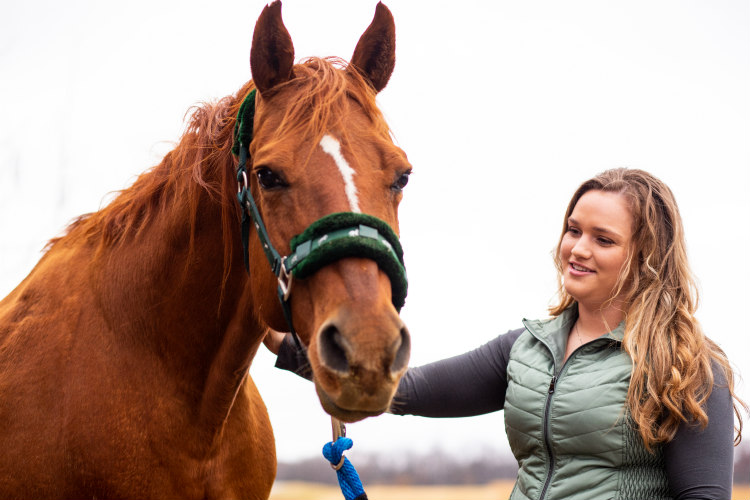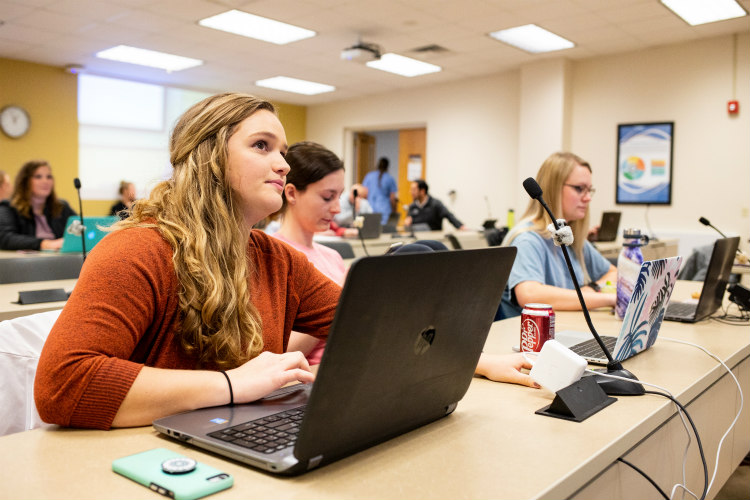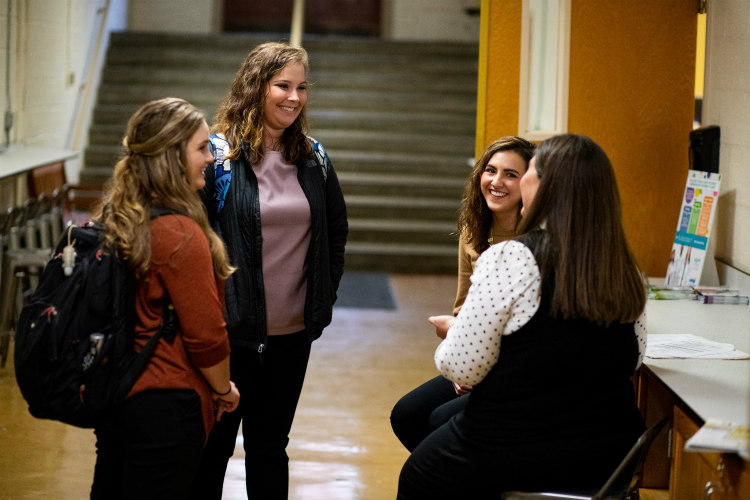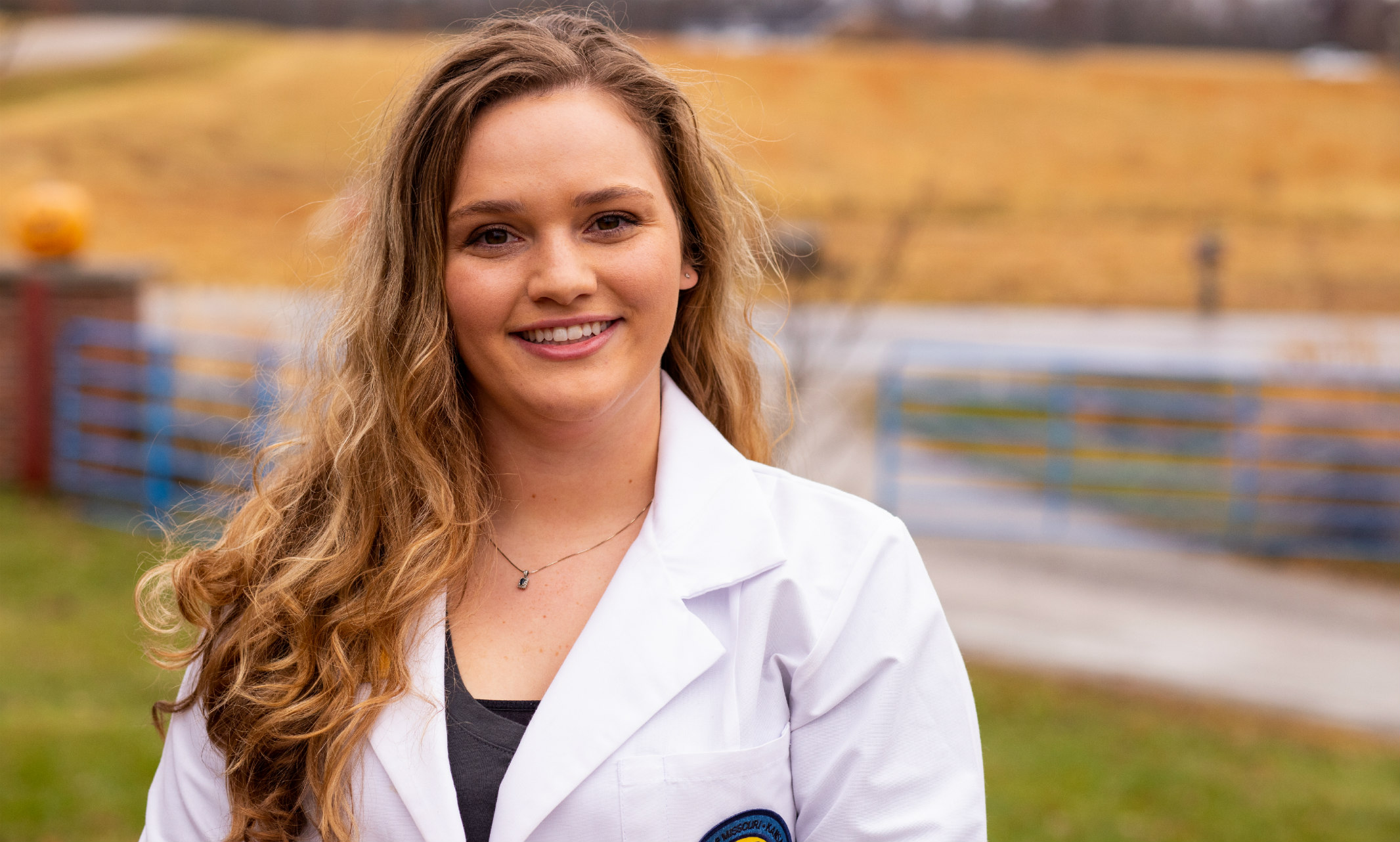Growing up in a small Missouri town riding horses on a cattle ranch is a part of Raeann Kilgore’s core framework. She loves rural life. She enjoys the tight-knit community she grew up in and interacting with people. So when it was time for the University of Missouri graduate to choose where she would attend pharmacy school, she chose the UMKC School of Pharmacy satellite location in Columbia.
“I chose the Columbia campus based on its location from home as well as the class size,” Kilgore said.
The petite, long-haired blonde from Green City, Missouri, isn’t interested in pursuing a career in big pharma — she would much rather have a large impact on improving access to health care in rural areas where she can connect with patients whose lives are similar to that of her family’s.
“I recognize the need for health care in these areas and have always had a strong desire to return to my community to provide health care in some form,” Kilgore said.
“While going to office hours in person isn’t really an option, my professors are more than willing to make arrangements to schedule a Zoom meeting or phone call, and they’re generally great at responding to email.”
Though she’s always been interested in medicine, it was a job shadowing experience she had with an independent pharmacy in high school that got the small-town woman interested in pharmacy. She fell in love with the personalized service and relationships the pharmacy had with its patients, employees and other care providers. That’s where she sees herself in the future.
“It helps to have relationships with patients because you have more personal connections with them and, as a farm girl myself, I can relate to them. I know their lifestyle and what kinds of things they’re doing. It’s a more holistic health care experience for both parties.”
Kilgore has already taken the initiative to immerse herself in diverse learning experiences to help her prepare for her pharmaceutical career. She spends her spare time volunteering at Cedar Creek Therapeutic Riding Center, a local horseback riding stable for people with disabilities in mid-Missouri.

“Cedar Creek gives me a sense of home away from home,” Kilgore said with a slight twang in her accent. “It also allows me to deal with diverse populations and broaden my perspective of health care. It teaches me how to communicate and bond with patients over a common passion.”
“It helps to have relationships with patients because you have more personal connections with them and, as a farm girl myself, I can relate to them.”
Given her expert riding experience – she’s been riding since she was three years old – Kilgore serves as a horse leader, guiding and directing the horse while patients ride. For people with disabilities, horse riding simulates a walking experience with the way their hips move as the horse is led around the stable.
“I once worked with a patient who had cerebral palsy. He had a particular horse he rode and, over time, learned to give commands. I nearly cried the first time I saw him ride by himself without me as a guide,” Kilgore recalled. According to Cedar Creek founder Karen Grindler, that patient eventually went on to ride at the American Royal.
In addition to her volunteer work, Kilgore is involved in numerous organizations through the School of Pharmacy and works as a pharmacy intern at University Hospital.
“My involvement in the American Pharmacy Association and other organizations gives me a chance to provide service to the community like blood pressure and blood glucose screenings, immunizations, drug take-back and other services that give me more career experience.”
“Being surrounded by like-minded individuals who are all passionate about the pharmacy profession has really given me inspiration to put 100% into everything I do at school and the organizations I’m involved with.”
Being based on a satellite campus, professors are nine times out of 10 not physically in the classroom. The satellite campus is a hallway of classrooms located in the lower level of the Mizzou Academic Support Center. When Kilgore goes to class, she’s sitting among her peers in front of a large projector screen where they can see the professor – usually based in Kansas City – teaching. Every chair has a microphone and a button, so if Kilgore needs to ask a question, she can press the button and wait to be called on. When she has the floor, she can speak directly into the microphone.

“Whether having the professor physically here or not is a challenge can be debatable,” she weighed. “While going to office hours in person isn’t really an option, my professors are more than willing to make arrangements to schedule a Zoom meeting or phone call, and they’re generally great at responding to email.”
That’s not to say satellite students don’t have professors to turn to. They have on-site faculty and advisors and the dean for the School of Pharmacy works closely with students.

“I love our class. We’re like a small family,” Kilgore exclaimed in her cheerful, high-pitched voice. “Being surrounded by like-minded individuals who are all passionate about the pharmacy profession has really given me the inspiration to put 100% into everything I do at school and the organizations I’m involved with. Doing so will allow me to be the best pharmacist I can be in the future and provide the newest services and best care to my future patients.”
“I recognize the need for health care in these areas and have always had a strong desire to return to my community to provide healthcare in some form.”
With only a semester left of her third year of pharmacy school, and having just completed the OSCE (objective structured clinical examination) – which she and her classmates “nearly freaked out over” in preparation – she’s looking forward to seeing where she matches for residency next year. She’s hoping to land in Washington, D.C., with the National Community Pharmacists Association.
Thinking ahead to the pharmacy school experiences she wants to carry into her career, Kilgore said she hopes to take away friendships that last a lifetime, knowledge to improve patients’ lives and leadership skills to someday lead her own team of community pharmacists.

